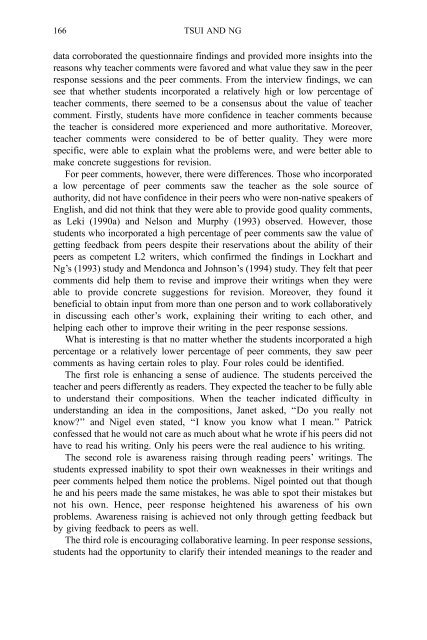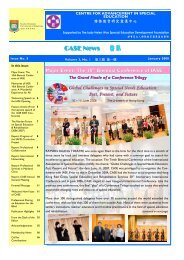Do Secondary L2 Writers Benefit from Peer Comments?
Do Secondary L2 Writers Benefit from Peer Comments?
Do Secondary L2 Writers Benefit from Peer Comments?
You also want an ePaper? Increase the reach of your titles
YUMPU automatically turns print PDFs into web optimized ePapers that Google loves.
166 TSUI AND NG<br />
data corroborated the questionnaire findings and provided more insights into the<br />
reasons why teacher comments were favored and what value they saw in the peer<br />
response sessions and the peer comments. From the interview findings, we can<br />
see that whether students incorporated a relatively high or low percentage of<br />
teacher comments, there seemed to be a consensus about the value of teacher<br />
comment. Firstly, students have more confidence in teacher comments because<br />
the teacher is considered more experienced and more authoritative. Moreover,<br />
teacher comments were considered to be of better quality. They were more<br />
specific, were able to explain what the problems were, and were better able to<br />
make concrete suggestions for revision.<br />
For peer comments, however, there were differences. Those who incorporated<br />
a low percentage of peer comments saw the teacher as the sole source of<br />
authority, did not have confidence in their peers who were non-native speakers of<br />
English, and did not think that they were able to provide good quality comments,<br />
as Leki (1990a) and Nelson and Murphy (1993) observed. However, those<br />
students who incorporated a high percentage of peer comments saw the value of<br />
getting feedback <strong>from</strong> peers despite their reservations about the ability of their<br />
peers as competent <strong>L2</strong> writers, which confirmed the findings in Lockhart and<br />
Ng's (1993) study and Mendonca and Johnson's (1994) study. They felt that peer<br />
comments did help them to revise and improve their writings when they were<br />
able to provide concrete suggestions for revision. Moreover, they found it<br />
beneficial to obtain input <strong>from</strong> more than one person and to work collaboratively<br />
in discussing each other's work, explaining their writing to each other, and<br />
helping each other to improve their writing in the peer response sessions.<br />
What is interesting is that no matter whether the students incorporated a high<br />
percentage or a relatively lower percentage of peer comments, they saw peer<br />
comments as having certain roles to play. Four roles could be identified.<br />
The first role is enhancing a sense of audience. The students perceived the<br />
teacher and peers differently as readers. They expected the teacher to be fully able<br />
to understand their compositions. When the teacher indicated difficulty in<br />
understanding an idea in the compositions, Janet asked, ``<strong>Do</strong> you really not<br />
know?'' and Nigel even stated, ``I know you know what I mean.'' Patrick<br />
confessed that he would not care as much about what he wrote if his peers did not<br />
have to read his writing. Only his peers were the real audience to his writing.<br />
The second role is awareness raising through reading peers' writings. The<br />
students expressed inability to spot their own weaknesses in their writings and<br />
peer comments helped them notice the problems. Nigel pointed out that though<br />
he and his peers made the same mistakes, he was able to spot their mistakes but<br />
not his own. Hence, peer response heightened his awareness of his own<br />
problems. Awareness raising is achieved not only through getting feedback but<br />
by giving feedback to peers as well.<br />
The third role is encouraging collaborative learning. In peer response sessions,<br />
students had the opportunity to clarify their intended meanings to the reader and

















